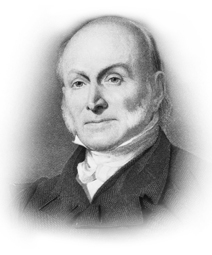|
|
Messages and Papers of John Quincy Adams
Contents:
Messages and Papers of
JOHN QUINCY ADAMS
March 4, 1825, to March 4, 1829

JOHN QUINCY ADAMS, sixth President of the United States, eldest son of John Adams, second President, was born at Braintree, Mass., July 11, 1767. He enjoyed peculiar and rare advantages for education. In childhood he was instructed by his mother, a granddaughter of Colonel John Quincy, and a woman of superior talents. In 1778, when only 11 years old, he accompanied his father to France; attended a school in Paris, and returned home in August, 1779. Having been taken again to Europe by his father in 1780, he pursued his studies at the University of Leyden, where he learned Latin and Greek. In July, 1781, at the age of 14, he was appointed private secretary to Francis Dana, minister to Russia. He remained at St. Petersburg until October, 1782, after which he resumed his studies at The Hague. Was present at the signing of the definitive treaty of peace in Paris, September 3, 1783. He passed some months with his father in London, and returned to the United States to complete his education, entering Harvard College in 1786 and graduating in 1788. He studied law with the celebrated Theophilus Parsons, of Newburyport; was admitted to the bar in 1791, and began to practice in Boston. In 1791 he published in the Boston Centinel, under the signature of "Publicola," a series of able essays, in which he exposed the fallacies and vagaries of the French political reformers. These papers attracted much attention in Europe and the United States. Under the signature of "Marcellus" he wrote, in 1793, several articles, in which he argued that the United States should observe strict neutrality in the war between the French and the British. These writings commended him to the favor of Washington, and he was appointed minister to Holland in May, 1794. In July, 1797, he married Louisa Catherine Johnson, a daughter of Joshua Johnson, of Maryland, who was then American consul at London. In a letter dated February 20, 1797, Washington commended him highly to the elder Adams, and advised the President elect not to withhold promotion from him because he was his son. He was accordingly appointed minister to Berlin in 1797. He negotiated a treaty of amity and commerce with the Prussian Government, and was recalled about February, 1801. He was elected a Senator of the United States by the Federalists of Massachusetts for the term beginning March, 1803. In 1805 he was appointed professor of rhetoric and belles-lettres at Harvard College, and accepted on condition that he should be permitted to attend to his Senatorial duties. He offended the Federalists by supporting Jefferson’s embargo act, which was passed in December, 1807, and thus became connected with the Democratic party. He resigned his seat in the Senatein March, 1808, declining to serve for the remainder of the term rather than obey the instructions of the Federalists. In March, 1809, he was appointed by President Madison minister to Russia. During his residence in that country he was nominated to be an associate justice of the Supreme Court of the United States, and Confirmed February, 1811; but he declined the appointment. In 1813 Adams, Bayard, Clay, Russell, and Gallatin were appointed commissioners to negotiate a treaty of peace with Great Britain. They met the British diplomatists at Ghent, and after a protracted negotiation of six months signed a treaty of peace December 24, 1814. In the spring of 1815 he was appointed minister to the Court of St. James, remaining there until he was appointed by Mr. Monroe Secretary of State in 1817. In 1824 Adams, Jackson, Crawford, and Clay were candidates for the Presidency. Neither of the candidates having received a majority in the electoral colleges, the election devolved on the House of Representatives. Aided by the influence of Henry Clay, Mr. Adams received the votes of thirteen States, and was elected. He was defeated for reelection in 1828 by General Andrew Jackson. On the 4th of March, 1829, he retired to his estate at Quincy. In 1830 he was elected to Congress, and took his seat in December, 1831. He continued to represent his native district for seventeen years, during which time he was constantly at his post. On the 21st of February, 1848, while in his seat at the Capitol, he was stricken with paralysis, and died on the 23d of that month. He was buried at Quincy, Mass.
Contents:
Chicago:
John Quincy Adams, "Title Page," Messages and Papers of John Quincy Adams in 858. Original Sources, accessed November 4, 2025, http://originalsources.com/Document.aspx?DocID=JWIPATX52V2EYZE.
MLA:
Adams, John Quincy. "Title Page." Messages and Papers of John Quincy Adams, in , page 858. Original Sources. 4 Nov. 2025. http://originalsources.com/Document.aspx?DocID=JWIPATX52V2EYZE.
Harvard:
Adams, JQ, 'Title Page' in Messages and Papers of John Quincy Adams. cited in , , pp.858. Original Sources, retrieved 4 November 2025, from http://originalsources.com/Document.aspx?DocID=JWIPATX52V2EYZE.
|